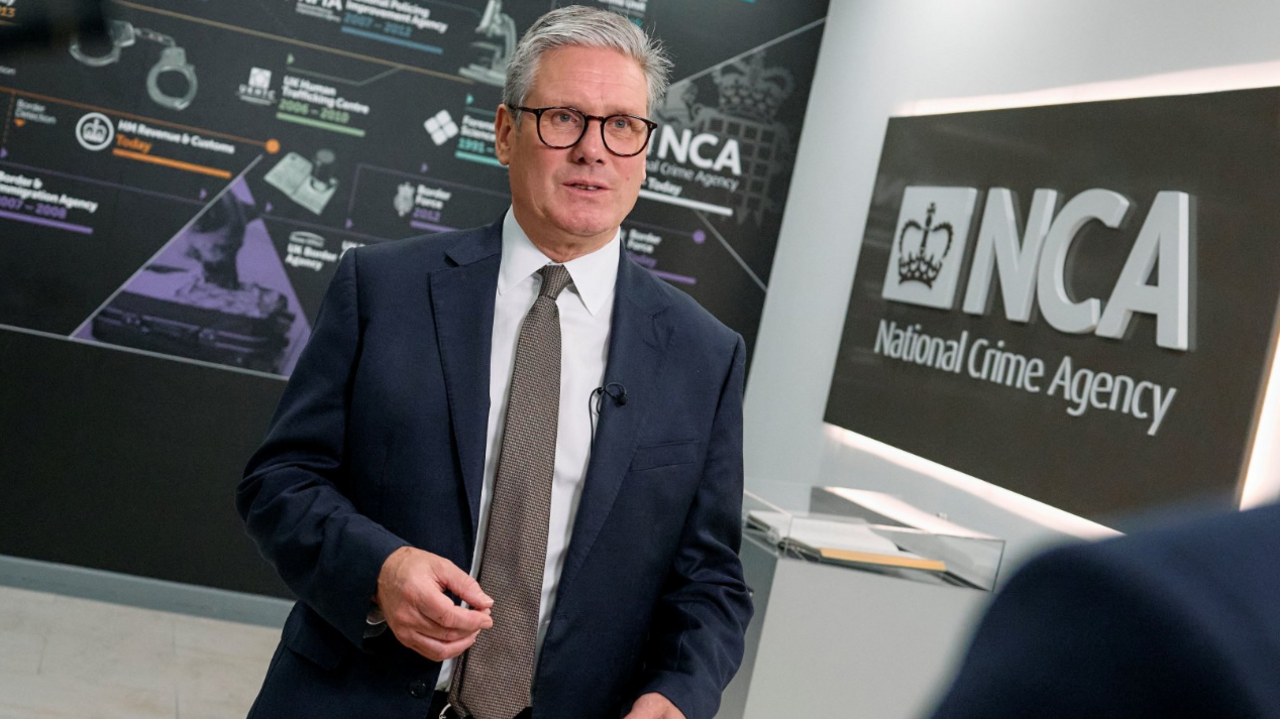We must stop smuggling gangs before they act - Starmer

- Published
Sir Keir Starmer has vowed to use counter-terrorism tactics to stop people-smuggling gangs "before they act", as he announced an extra £75m to police the UK's borders.
In a speech, the prime minister said the UK's new Border Security Command (BSC) would "treat people smugglers like terrorists", with enhanced powers to trace suspected human traffickers and shut down their bank accounts.
The cash boost, which will be used to hire hundreds of new investigators and intelligence officers, takes the funding for the BSC to a total of £150m.
But former immigration chief Kevin Saunders said the changes would not deter illegal migrants from coming to the UK and stop small boat crossings.
Starmer seeks new EU deal to stop small boats gangs
- Published14 September 2023
Smuggler reveals operation to help Vietnamese reach UK
- Published28 October 2024
Migrant-smuggler arrested after BBC investigation
- Published13 May 2024
In a speech to the Interpol general assembly in Glasgow, which brings together senior police and ministers from nearly 200 member countries, the prime minister said it was his "personal mission to smash the people-smuggling gangs".
"We are going to treat people smugglers like terrorists - we are taking our approach to counter terrorism, which we know works, and applying it to the gangs," he said.
"We have got to combine resources, share intelligence and tactics, and tackle the problem upstream, working together to shut down the smuggling routes."
The government has said it will pass new laws to give those tackling smuggling gangs enhanced powers to trace suspects' movements and freeze their bank accounts.
Meanwhile, the BSC will get additional funding for:
An extra 300 staff to strengthen global partnerships and deliver new legislation
An additional 100 specialist investigators and intelligence officers for the National Crime Agency (NCA), to tackle criminals involved in people smuggling
New NCA technology around advanced data exploitation, to boost collaboration with European partners investigating trafficking networks
Creating a new specialist intelligence unit examining information from key police forces
Boosting the Crown Prosecution Service’s ability to deliver charging decisions more quickly on international organised crime cases
However, speaking to BBC Radio 4's Today programme, Mr Saunders, who was chief immigration officer for ports, said "unfortunately what the prime minister is trying to do is not feasible".
The UK would only be able to prosecute and jail people smugglers "in the UK and the majority of people smugglers are actually based in the Middle East and Turkey", Mr Saunders said.
Under the UK's asylum system "you can't deport failed asylum seekers" who destroy documents, Mr Saunders said.
Without official documents, the UK is often unable to prove the asylum seekers country of origin meaning their home countries will refuse to take them.
A Conservative Party spokesperson said: "It is a shame that Starmer has not recognised the extent of the crisis in the Channel sooner, as he and the Labour Party voted against numerous measures to stop the gangs while they were in opposition.
"If Starmer continues to ignore the need for a deterrent to stop migrants crossing the Channel, there will be more deaths in the Channel as more and more migrants continue to cross it."
Sir Keir cancelled the Rwanda deportation scheme, which was the Conservative government's plan to discourage Channel crossings.
More than 5,400 people crossed the Channel in small boats in October - the highest monthly figure since October 2022.
In total, more than 27,500 people have made the crossing so far this year, more than the same period in 2023.
Home Secretary Yvette Cooper said the high number of crossings in October was linked to unusually fair weather.
However, she told the BBC the government could not just blame weather conditions for spikes in illegal immigration and had to "go after the criminal gangs at the heart of this".
Pressed over when a drop in small boat crossings could be expected, Cooper would not commit to a specific target.
She added that it would take time to get investigators and new technology in place but the government wanted to make progress "as rapidly as possible".